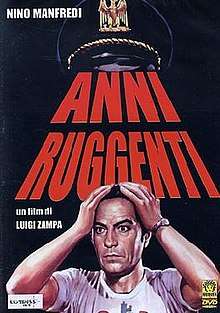Roaring Years
Roaring Years (Italian: Gli anni ruggenti) is a 1962 Italian comedy film directed by Luigi Zampa, set in the 1930s during the Fascist period of Benito Mussolini. It stars Nino Manfredi and Gino Cervi, and was inspired by the satirical comedy "The Government Inspector” by Nikolai Gogol.
| Roaring Years | |
|---|---|
 Film poster | |
| Directed by | Luigi Zampa |
| Produced by | Achille Piazzi |
| Written by | Sergio Amidei (story) Ruggero Maccari (dialogue) |
| Starring | Nino Manfredi and Gino Cervi |
| Music by | Piero Piccioni |
| Cinematography | Carlo Carlini |
| Edited by | Eraldo Da Roma |
| Distributed by | Incei Film |
Release date | 21 April 1962 |
Running time | 110 minutes |
| Country | Italy |
| Language | Italian |
It won Best Feature at the 1962 Locarno International Film Festival.
Plot summary
The film portrays the corrupt administration of an Apulia town during the fascist regime of 1937, after it has learned, in a roundabout way, of a pending anonymous visit of a government inspector from Rome. The inspector will determine if the administration adhered to the government's strict guidelines for economic and social planning.
The threat of the inspection creates terror in the administrators, who fear their misdeeds will be revealed. Most fearful are those guilty of enriching themselves from public funds, and other abuses. They resort to pathetic staged measures to make it appear that they remained "honest administrators" and "good fascists".
An unsuspecting insurer, Romeo Battifiori, arrives in town and is mistaken for the inspector. He is made the object of every honour and, of course, is utterly deceived. Eventually, the real inspector arrives.
Location
The movie was shot entirely in Ostuni and Alberobello.
Cast
- Nino Manfredi as Omero Battifiori
- Gino Cervi as Salvatore Acquamano
- Michèle Mercier as Elvira Acquamano
- Gastone Moschin as Carmine Passante
- Salvo Randone as the Anti-fascist doctor De Vincenzi
- Angela Luce as Rosa De Bellis
- Rosalia Maggio as Nunzia Acquamano
- Linda Sini
- Carla Calò
- Annetta Esposito
- Gino Brillante
- Giuseppe Ianigro as Nicola De Bellis
- Gaetano Morino
- Enzo Petito
- Mara Maiello
- Ruggero Pignotti
- Massimo Marchetti
- Lino Crispo
- Mario Passante
- Nunzia Fumo
- Totò Ponti
- Giulio Marchetti
- Livia Grazioli
- Fanfulla
- Alfredo Rizzo